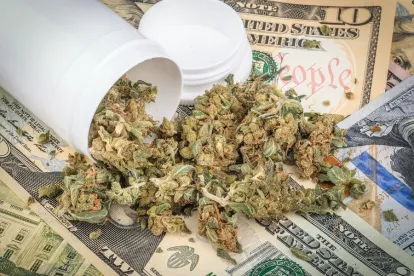Public interest in the potential health benefits of CBD (cannabidiol) is responsible for a whole new market segment of health and wellness foods and supplements that features CBD as an ingredient. CBD is one of more than 100 cannabinoids in the cannabis plant, but unlike THC (tetrahydrocannabinol), CBD is not psychoactive and won’t get the user “high.” The CBD market is expected to top $591 million this year, and with federal protections could grow to $22 billion by 2022. Fueling this trend is scientific and anecdotal evidence of CBD’s effect on anxiety, pain, inflammation, nausea and seizures, as well as its value in fighting the opioid crisis.
Given this intense interest, the Wilson Elser Cannabis Law practice team receives daily calls from people who want to know, “Is CBD legal?” Most who have sought this answer online find overly simplistic conclusions or, worse, legal advice that is dangerously wrong. When considering the legality of CBD, one must ask two equally important questions: Is CBD legal under the Controlled Substances Act (CSA)? Is CBD legal under U.S. food and drug laws? Most people tend to focus on the former due to media coverage on the evolving legal protections at the federal level, including new protections for hemp-derived CBD that are now confirmed to be included in the 2018 Farm Bill. Though not as sexy as the CSA, the Federal Food, Drug, and Cosmetic Act (FTCA) very likely presents the greater long-term problem for the CBD industry because there are few available protections to the legal risks presented by the FTCA.
To appreciate the impact of the 2018 Farm Bill on the legality of hemp-derived CBD, it is necessary first to address the current legal landscape and relevant federal agencies.
Marijuana versus Industrial Hemp
Under federal law, marijuana is a Schedule I controlled substance and illegal for any reason. The CSA defines marijuana as “all parts of the plant Cannabis sativa L − and every compound, manufacture, salt, derivative, mixture or preparation of such plant, its seeds or resin.”
Industrial hemp is a subspecies of cannabis characterized by fibrous stalks and very low levels of THC. It is an agricultural commodity with many uses and was widely grown throughout human history as a cash crop until the 1920s when various states and eventually the federal government made all forms of marijuana illegal. After years of debate, in 2014 via the federal Farm Bill, Congress authorized state pilot programs to study the cultivation of and commercial market for industrial hemp as a viable agricultural crop. The Farm Bill’s definition of industrial hemp includes any part of the plant, including the flower. Unlike the CSA, the 2014 Farm Bill distinguished industrial hemp from marijuana based on the concentration of THC contained in each species. The currently accepted legal definition of industrial hemp is any part of the cannabis plant that has no more than 0.3 percent of THC on a dry weight basis.
Cannabis is therefore regulated by the federal government within three broad categories, including (1) marijuana regulated under the CSA, (2) exempted parts of the cannabis plant under the CSA and (3) industrial hemp under the Farm Bills. Whether CBD is classified as a controlled substance is based primarily on the part of the plant from which the CBD is derived and whether it is derived from hemp as authorized by the Farm Bill. If CBD is derived from marijuana, it falls within Schedule I of the CSA, but if it is derived from properly sourced industrial hemp, it should fall outside the CSA.
The 2018 Farm Bill
A major turning point for industrial hemp came in April 2018 with the introduction of Senate Majority Leader Mitch McConnell’s Hemp Farming Act of 2018 (HFA). Senator McConnell, a hemp advocate from Kentucky, later decided that the HFA would have a better chance of passage within the 2018 Farm Bill rather than as an independent bill. A companion bill also was introduced in the House of Representatives. After approval and reconciliation by the Senate and House, the final language within the 2018 Farm Bill will make drastic changes to the current laws concerning industrial hemp. It repeals section 7606 of the Agricultural Act within the 2014 Farm Bill, which mandated that hemp be grown under the auspices of a state agricultural pilot program or institution of higher education. It also removes industrial hemp from the CSA’s definition of “marijuana” and from Schedule I.
The 2018 Farm Bill should end the debate over the legal status of the plant under the CSA. All products made from industrial hemp, including CBD oil, will be legal under the CSA if they contain no more than 0.3 percent THC. State agriculture departments and Native American tribes will be free to regulate hemp in the same manner that any other agricultural commodity is regulated. The 2018 Farm Bill also should end the debate on the extent to which private businesses are allowed to engage in the commercial sales of products derived from industrial hemp, and whether hemp-derived products may be sold through interstate commerce into states that do not have industrial hemp agricultural pilot programs. The Drug Enforcement Agency (DEA) has consistently taken the position that this commercial activity was impermissible under the 2014 Farm Bill. It is hard to see how the DEA will have a legal basis to make this argument given the language of the 2018 Farm Bill.
With broad federal protections for industrial hemp−derived products to be in place soon, we turn our attention to the legality of CBD under U.S. food and drug laws.
The FDA and CBD
The U.S. Food and Drug Administration (FDA) is responsible for protecting the public health by ensuring the safety and efficacy of drugs and medical devices and the safety of the nation’s food supply. The FDCA forbids adulterated or misbranded food and drugs from entering into interstate commerce. It is the FDA’s position that all cannabinoids, including CBD, are impermissible additives that adulterate food and supplements for both humans and animals. The FDA does not differentiate the source of CBD – whether derived from cannabis or hemp – but rather considers all CBD to be an illegal food ingredient, regardless of source.
Since 2015, the FDA has sent a number of letters to companies that sell CBD-infused oils and food products in interstate commerce, warning against making impermissible health claims. In the warning letters, the most recent of which is dated July 31, 2018, the FDA states that CBD products are in fact drugs, and not dietary supplements, under the FDCA because they are intended for use in the diagnosis, cure, mitigation, treatment or prevention of disease and/or because they are intended to affect the structure or any function of the body. Accordingly, the “drugs” require FDA approval under the FDCA.
The FDA also concludes that CBD products are not dietary supplements under the Dietary Supplement Health and Education Act (DSHEA). Under DSHEA, dietary ingredients marketed in the United States prior to October 15, 1994, may be used in dietary supplements without notification to the FDA, but new dietary ingredients cannot be used without a new dietary ingredient notification that provides the FDA with evidence establishing that the ingredient is “reasonably expected to be safe.” The FDA has concluded that CBD does not fall within the definition of a dietary ingredient because the FDA had previously authorized CBD for investigation as a new drug, for which substantial clinical research already had been conducted and made public. This is called Investigational New Drug Preclusion, or IND Preclusion. The FDA cites Epidiolex® and Sativex® as examples of clinical investigations regarding CBD that have been made public, beginning in 2006.
There has been some discussion as to whether the FDA’s position on IND Preclusion may be challenged on the basis that CBD products were sold in interstate commerce prior to the publication of substantial clinical investigations of CBD. No formal challenge has been made to date, however.
Another obstacle to the legal status of CBD under FDCA is the refusal of FDA to recognize CBD as “Generally Recognized as Safe” (GRAS), which is required of all food additives. Although GRAS determination has been made in the case of hemp seed oil, the FDA concludes that further research is needed for CBD. Future GRAS applications certainly will be made for CBD, but this must be done in accordance with the scientific process and will take time.
In the meantime, the FDA has made clear that it still considers CBD unlawful in foods and supplements. In early November 2018, FDA’s Director of Dietary Supplement Programs is reported to have stated at a conference that “just because we haven’t taken enforcement action, people seem to think [CBD] is OK. [But] anyone who thinks it is lawful is mistaken.”
Epidiolex
In June 2018, the FDA approved the first CBD-based drug, Epidiolex, for treatment of childhood seizures associated with two rare forms of epilepsy. In its June 25 press release, the FDA states: “CBD is currently a Schedule I substance because it is a chemical component of the cannabis plant.” By definition, a Schedule I substance has no accepted medical use. To resolve this conflict, in September 2018 the DEA rescheduled Epidiolex to Schedule V, the least restrictive schedule under the CSA. That action by the DEA only applies to Epidiolex and not to CBD generally.
Many commentators have argued that the FDA misses the mark by making the broad statement that CBD is a Schedule 1 substance under the CSA “because it is a chemical component of the cannabis plant.” Despite conflicting statements by the DEA, the Farm Bills establish that CBD is a controlled substance only if it is derived from non-exempted parts of the marijuana plant, but it should not be a controlled substance if it is derived from industrial hemp. The Ninth Circuit has confirmed that the Farm Bills preempt and supersede the CSA.
Unfortunately for those who want to capitalize on the booming demand for hemp-derived CBD food and supplement products, this is largely a distinction without a difference and underscores the new regulatory hurdles for federal approval of cannabis- and hemp-based products. Regardless of the source of CBD, the FDA has concluded that CBD is a drug with a real health benefit that is used to treat certain epileptic seizures and is being investigated for other medical uses. Because the FDA has made this determination, CBD cannot be freely added to food or supplements that are sold to the public.
In sum, though the FDA’s recent approval of Epidiolex has been widely viewed as a positive development by those who want to see a change to the federal scheduling of marijuana, it has unexpectedly hamstrung the fledgling market for hemp-derived CBD products that are in high demand, including when used to fight the opioid crisis.
CBD and State Regulations
Numerous states recently have weighed in on the legality of adding CBD or hemp to foods under state law. While states regulate food alongside and in cooperation with the FDA, states are responsible for food safety within state borders while the FDA’s mandate is to regulate interstate food and drug safety. We caution, however, that regardless of whether a state has taken a specific position on the issue, all states are obligated to refrain from enacting state food and drug laws that directly conflict with FDA regulations.
California’s Announcement on CBD Sets off Alarms
On July 6, 2018, in response to numerous inquiries from CBD industry stakeholders and members of the public, the California Department of Public Health (CDPH) issued a public statement that CBD sourced from industrial hemp cannot be used in food in California. The CDPH relies on the FDA’s position, explaining: “California incorporates federal law regarding food additives, dietary use products, food labeling, and good manufacturing practices for food,” and that the “FDA has concluded that it is a prohibited act to introduce or deliver for introduction into interstate commerce any food (including any animal food or feed) to which THC or CBD has been added … regardless of the source of the CBD – derived from industrial hemp or cannabis.”
The CDPH distinguishes CDB added to medicinal and adult-use “manufactured cannabis products,” including cannabis edibles, which are regulated by the CDPH Manufactured Cannabis Safety Branch. It explains that “although California currently allows the manufacturing and sales of cannabis products (including edibles), the use of industrial hemp as the source of CBD to be added to food products is prohibited.” Therefore, California takes the position that CBD sourced from marijuana is permitted in food products but is considered a cannabis product that only may be sold by retailers properly licensed under state cannabis regulations. On the other hand, CBD sourced from industrial hemp is not permitted in any food product under any condition.
California’s public statement set off alarms within the CBD and hemp industries, and it precipitated several other states to make their own statements on the issue.
Other States Weigh In
Several other states have recently clarified their respective positions on CBD under state law, though most do not distinguish between CBD that is derived from hemp versus marijuana. Many states do have exemptions under controlled substances state laws that mirror federal exemptions under the CSA.
Alabama: Guidance recently released by the state’s attorney general makes clear that “all CBD is illegal under Alabama law, except for the prescription drug Epidiolex.”
Alaska: In a September 2018 email, the state's Department of Environmental Conservation wrote "there are no lawfully approved sources of CBD" available in Alaska. As a result, the substance cannot be sold or used in permitted food establishments.
Arizona: Arizona has a medical marijuana program, but state law enforcement has interpreted the law to exclude cannabis extracts, including CBD. There is a dispute heading to the state's Supreme Court.
Colorado: Colorado’s House Bill 19-1295, which was signed into law in May 2018, modifies the Colorado Food and Drug Act to make explicit that food and drugs containing industrial hemp are not adulterated or misbranded under state law, under certain conditions.
Illinois: In late August 2018, Governor Rauner signed a bill legalizing industrial hemp. The bill legalizes the farming of industrial hemp for commercial, research or pilot programs. It also permits the use of industrial hemp in health food.
Indiana: Indiana recently has passed legislation permitting the distribution and retail sale of “low-THC hemp extract.”
Iowa: On August 17, 2018, the Iowa Department of Health issued a position statement on CBD, stating "it is the position of the Department that CBD products are not legal in the state of Iowa, with few exceptions.” One of the exceptions includes products produced and approved under Iowa's Medical Cannabidiol Act that contain less than 3% THC.
Kansas: The Kansas legislature passed a bill in June 2018 that removed from the state’s controlled substances list any hemp products that do not contain THC. The industry has taken that to mean CBD oil is permitted so long as it contains zero THC.
Kentucky: The definition of marijuana under Kentucky state law exempts hemp-derived CBD products.
Michigan: The possession, purchase or sale of marijuana or any marijuana product, including CBD, must be done in compliance with the Michigan Medical Marijuana Act and Medical Marijuana Facilities Licensing Act. Any possession or transfer of industrial hemp must be done in compliance with Michigan's Industrial Hemp Research Act. The Act authorizes growing and cultivating of industrial hemp for research purposes only and does not authorize its sale or transfer.
Minnesota: Though Minnesota has little to no regulation of industrial hemp−derived CBD, the Minnesota Board of Pharmacy warns that the industry is too liberally interpreting the law. In an October 2018 article, Executive Director Cody Wiberg said, "I've sometimes characterized this as the Wild, Wild West. This is a very rapidly developing industry. There is actually very little regulation of it. The sellers will say this is a dietary supplement, the FDA has actually said no." Wiberg also said "we don't think they're legal right now," and he has urged caution among consumers.
Missouri: In September 2018, the Missouri Department of Agriculture stated that "the legality of CBD oil is currently under review,” and that “we don't want to make any premature legal interpretations because of the impacts the federal Farm Bill may have."
Montana: Under Montana's Hemp Pilot Program, approved products include alcoholic beverages, including beer and distilled and infused spirits, and cannabinoid oils, including CBD for food, cosmetic and health products.
Nebraska: On November 16, 2018, the Nebraska Attorney General reminded sellers within the state that his office believes CBD is illegal. He has issued a memo to law enforcement stating that CBD remains illegal to possess, manufacture, distribute or dispense.
New York: New York has a robust industrial hemp pilot program regulated by the state’s Department of Agriculture and Markets. Although the department hasn't explicitly permitted CBD-infused foods, it has a sample “CBD Research Partner Agreement” on its website that may be interpreted to imply that those licensed to grow industrial hemp can add CBD to food products.
Ohio: In August 2018, the Ohio Board of Pharmacy issued a FAQ stating that CBD oil derived from hemp has always been illegal, and that CBD is legal only when extracted and sold through the state's medical marijuana program. The FAQ cites the DEA's reasoning that cannabinoids such as CBD are found in trace amounts only on the exempt parts of the plant.
Tennessee: In 2014, Tennessee removed industrial hemp from the definition of marijuana in the state criminal code. In a February 2018 raid dubbed “Operation Candy Crush,” deputies from Rutherford County, Tennessee, closed approximately 25 retail stores and charged the owners for selling gummies made with CBD oil. All charges were later dropped, however, on the grounds that testing by the state could not distinguish if the oil came from marijuana or industrial hemp. After Candy Crush, state officials stated that the burden of proving CBD oil is not from hemp is on the state, not the accused.
Texas: Although Texas initially considered issuing draft guidance that would bar the sale of CBD-infused products, the state has refrained from issuing guidance while it reevaluates its position.
Washington: Washington allows licensed marijuana producers to use CBD from a source not licensed by the state’s Liquor and Cannabis Board, so long as the CBD product has a THC level of 0.3 percent or less on a dry weight basis and has been lab tested.
Wisconsin: In May 2018, the state issued a report concluding that the sale of CBD was illegal under state and federal law. The state Attorney General (AG) issued a statement that “law enforcement has encountered examples of products claiming to be CBD oil that resulted in people getting hurt and sick.” Shortly thereafter, however, the AG backtracked and confirmed that products made from industrial hemp are lawful, including hemp-derived CBD. The AG’s memo explains: “With the 2018 Farm Bill now working its way through Congress, it is likely that our current laws will be changed even further to make industrial hemp's legality clear. Therefore, I am advising law enforcement not to take enforcement action against products made from industrial hemp that is grown under a lawful hemp research pilot program, including CBD, until Congress considers changes to the law, enabling the Wisconsin State Legislature to further clarify the status of these products.” Stores are currently permitted to sell CBD oil produced in compliance with state regulations.
An Absurd Result
These federal and state positions have created an absurd result. CBD now may be manufactured and distributed in many states with few restrictions but CBD may be added to food products in many states only if it is derived from marijuana. It is difficult to logically reconcile this “schizophrenic” state of the law. Although the FDA has always prohibited cannabinoids in food, it has to date only taken enforcement action when CBD products making health claims were sold online or were otherwise introduced into interstate commerce. It remains to be seen what position will be taken by the FDA when cannabis edible products are able to move in interstate commerce, thus triggering the FDA’s jurisdiction.
Evaluating the Risk
Some who sell hemp-derived CBD products may be tempted to keep moving forward and hope for the best. After all, that’s basically what the cannabis industry did vis-à-vis the DOJ and DEA in the face of federal illegality, and the FDA has remained largely on the sidelines when it comes to CBD because, until recently, few CBD products have been available in interstate commerce. Despite its July 2018 statement, California’s Department of Public Health has not yet taken any visible enforcement action on non-cannabis CBD.
Many may therefore ask what risk there is in simply continuing to sell their products. It is tempting to focus on potential regulatory enforcement action as the greatest risk, including from recalls, seizures, injunctions and civil penalties. Tort exposure to civil lawsuits, however, is likely the larger problem. Unlike selling federally illegal cannabis products pursuant to a state-regulated market where participants are protected under state laws, no such protection exists for sellers of CBD products that are considered adulterated and misbranded under both federal and state law. Even in states that allow CBD in food products, or in states that have not yet announced a formal position, the FDA’s prohibition may be enough for the determination by a jury that such products are illegally adulterated and misbranded, particularly if the CBD product is being sold in interstate commerce.
Most states have consumer protection laws that provide statutory remedies against companies that sell adulterated, mislabeled, misbranded or contaminated products. Those statutes may provide the basis for consumer class actions brought against companies that sell allegedly adulterated or misbranded food products containing CBD. Importantly, insurance companies often decline coverage for these claims, leaving the company to fend for itself. Uninsured losses arising out of similar consumer class actions have proven problematic for the dietary supplement industry for many years.
Meanwhile, class-action attorneys will be on the hunt for impermissible claims or the marketing of ingredients not approved by the FDA. Products must be labeled accurately, or they are in violation of federal and state law. Health claims must be avoided for foods and beverages that cannot claim to treat, cure or diagnose a disease. Any company that markets a dietary supplement must have adequate substantiation for any health claim made. CBD stakeholders also should be on the alert for contamination claims. Even trace amounts of THC in a hemp-derived CBD product can potentially form the basis of substantial liability, and especially if not properly disclosed on the product label.
Ultimately, the new federal protections contained in the 2018 Farm Bill will move the CBD-based food and supplement industry closer to unrestricted national and international distribution of hemp-derived CBD products. Until approved by the FDA, however, CBD as an ingredient in foods and supplements will continue to be risky. That approval process within the FDA may take months or, more likely, years. In the meantime, it is ironic that removal of the DOJ and DEA’s authority over hemp-derived CBD will pave the way for the stepped-up jurisdiction and enforcement by the FDA, and a heightened risk of civil lawsuits as CBD enters the mainstream.





 />i
/>i

